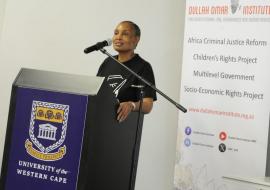
Cooperative Governance and Traditional Affairs Minister, Thembi Nkadimeng, has urged South Africans to vote in the upcoming elections.
“Your vote is not merely a mark on a ballot paper; it is a voice – a voice that speaks volumes, resonating with the hopes, dreams and aspirations of our society.
“It is a symbol of your commitment to the principles of democracy,” she said.
Nkadimeng was addressing a conference on the impact of the upcoming General Elections on intergovernmental relations at the University of the Western Cape.
The National Research Chair organised the Multilevel Government, Law, and Development event at the Dullah Omar Institute.
The conference addresses critical questions regarding governance, particularly concerning the challenges posed when different parties or coalitions govern at various levels of government.
Nkadimeng used her platform to call on South Africans to unite in their diversity and go to their designated voting stations with purpose and conviction.
“Regardless of your political affiliations or beliefs, your vote is a precious right – one that countless individuals have fought and sacrificed for throughout our history.
“It is a privilege denied to many worldwide yet bestowed upon us as South Africans. Let us not take this privilege for granted, but rather cherish it and wield it wisely.”
This as the country is set to go to the polls on 29 May 2024.
Coalitions
Nkadimeng touched on the instability caused by coalitions since the local government elections have underscored that some political parties are struggling to cope with the delicate demands and dilemmas of coalition politics.
She highlighted the complexities involved and emphasised the importance of cooperation and coordination among government spheres, acknowledging the strain caused by conflicting agendas and ideologies.
These include “unscrupulous manipulation” by smaller parties to have governance by a small unrepresentative group of individuals and bribes with little thought on the impact of the same on the municipality and its ability to deliver services.
Another hurdle, she said, is the infighting in councils characterised by walkouts, leading to an inability to adopt budgets, resulting in an administration that cannot spend its budget to address service delivery backlogs.
The Minister spoke of the lack of due diligence when making key appointments, which results in compromised individuals appointed in critical positions.
“Yet, it is precisely during these moments of divergence that the resilience of our intergovernmental relations system is put to the test.
“How do we navigate the waters of political pluralism while upholding the principles of cooperative governance? How do we bridge the divide between divergent political entities to ensure the seamless delivery of services and the pursuit of shared objectives? These are questions that demand thoughtful consideration and innovative solutions.”
She also discussed lessons learned from the 2021 Local Government Elections, emphasising the need for coalition regulation to maintain stability.
Nkadimeng stressed the significance of legal frameworks, institutional mechanisms, and fostering dialogue and collaboration.
She reiterated the constitutional principle of cooperative government and intergovernmental relations, regardless of electoral outcomes, emphasising its importance for effective governance.
Central to the notion of intergovernmental relations, according to Nkadimeng, is the recognition of the interdependence among the three spheres (national, provincial and local) of government.
She explained that each sphere possesses distinct powers, functions, and institutions, yet they are inherently interconnected.
“Therefore, all spheres of government have to respect each other's autonomy while keeping one another informed of new policies and developments.”
Intergovernmental relations extend beyond mere cooperation. However, according to Nkadimeng, they encompass a complex network of interactions involving government institutions and civil society.
Effective coordination of public policies among national, provincial, and local governments is essential for ensuring coherent and impactful governance.
Regardless of the electoral outcomes when the South Africans go to the polls, she said she believes that it is important for all political parties to adhere steadfastly to the principles outlined in the Constitution of the country.
“Upholding the ideals of cooperative government and intergovernmental relations is not contingent upon political affiliation but is a shared responsibility integral to the fabric of our democracy.”
She concluded by outlining measures to maintain resilience in the face of political changes, including promoting continuity, trust, cooperation, and building institutional capacity within the intergovernmental relations framework. – SAnews.gov.za


